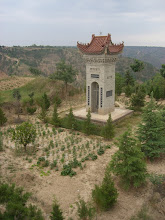There are some advantages to being Asian American in China. I blend in and don't get yelled at by complete strangers nor do people stare at me. While alone on the street, there is a sense of being invisible, a peaceful relief. In the classroom, students think they can understand my English better because I look like them. Colleagues and strangers feel a certain level of comfort around me because in their eyes we share ancestors. Some feel connected to the familiarity of my physical appearance and that somehow breaks the ice of shyness making it easier to connect. I don't get called upon to be the token foreigner, the non-Asian face that can dance and sing and give an impromptu speech with a 10 second notification. It seems like being Asian American in China can be so much easier than for other Americans.
In Gansu though, it was mentally wearing as I often fought and defended my identity as an American who spoke broken Chinese and was trying to understand Chinese culture. People shouted out hello to my sitemate as we walked past, but I was the one who was attacked with curiosity, a barrage of questions about the foreigner sitting with me. It was exhausting having attention as the assumed translator, followed by a million personal questions as people tried to understand why my Chinese was so poor when I looked like a Chinese person. I had to learn how to deal with people not understanding why in my eyes I was American. I had to learn to accept that even when I explained my adoption story and used the Chinese phrase American with Chinese ancestors, I would forever be defined as Chinese because our definitions were just different. In Gansu, one was defined by one's physical appearance rather than one's mannerisms, ways of thinking, language, and passport. Because of my black hair, I became Chinese by default, an owner of a green card, but someone who totally understands Chinese culture because of my skin and can learn the language faster because of my genes.
During my stay in Gansu, I didn't realize how exhausting it was until I lived a year in Chengdu. In Chengdu, people asked, "Where are you from?"
"I am American with Chinese ancestors."
Most of the time, the questions ended there. I was not assumed to be a translator. I was not assumed to be fluent in Chinese. I was not stared at because I spoke English. Many people in Chengdu understood what it meant to be Chinese American and didn't try to force me to match their notions of me being a Chinese speaking woman from China married with children. I was left in peace. Living in Chengdu as an Asian American was easier than living in Gansu because I didn't have to expend energy to defend my identity against a wall of assumptions. Just like how it was easier to live in Seattle than in small town Alabama, in Chengdu I lived without daily conversations that were sparked by my skin color.
Some may think, "Who cares if people assume that you are Chinese. You blend in and don't get unwanted attention. Or isn't it fun to help people become aware of their stereotypes and assumptions?"
For all of us who get unwanted attention or have to defend our identities especially if it persists for days, months turning into years, we face the draining weariness of battle fatigue. Constantly hitting that wall of rarely being understood leaves its mark even if it's unconscious.
It has been a breath of rejuvenating energy living in Chengdu where I can breathe a sigh of relief as people accept without questions that I am a foreign guest in their city.
Wednesday, May 23, 2012
Subscribe to:
Post Comments (Atom)

No comments:
Post a Comment